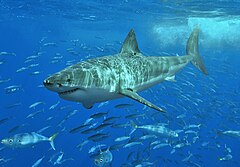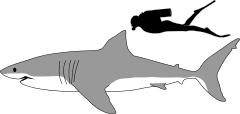Great White shark
| Great white shark Temporal range: 16–0 Ma Miocene to Recent |
|
|---|---|
 |
|
 |
|
| Scientific classification | |
| Kingdom: | Animalia |
| Phylum: | Chordata |
| Class: | Chondrichthyes |
| Order: | Lamniformes |
| Family: | Lamnidae |
| Genus: |
Carcharodon A. Smith, 1838 |
| Species: | C. carcharias |
| Binomial name | |
|
Carcharodon carcharias (Linnaeus, 1758) |
|
 |
|
| Global range highlighted in blue | |
The great white shark (Carcharodon carcharias), also known as the great white, white pointer, white shark, or white death, is a species of large lamniform shark which can be found in the coastal surface waters of all the major oceans. The great white shark is notable for its size, with mature female individuals growing up to 6.1 m (20 ft) in length and 1,950 kg (4,300 lb) in weight. However most are smaller, males measuring 3.35 to 3.96 m (11 ft 0 in to 13 ft 0 in) and females 4.57 to 4.88 m (15 ft 0 in to 16 ft 0 in) on average. According to a 2014 study the lifespan of great white sharks is estimated to be as long as 70 years or more, well above older estimates, making it one of the longest lived cartilaginous fish currently known. According to the same study, male great white sharks take 26 years to reach sexual maturity, while the females take 33 years to be ready to produce offspring. Great white sharks can accelerate to over 56 km/h (35 mph) for short bursts.
The great white shark has no known natural predators other than the killer whale. The great white shark is arguably the world's largest known extant macropredatory fish, and is one of the primary predators of marine mammals. It is also known to prey upon a variety of other marine animals, including fish and seabirds. It is the only known surviving species of its genus Carcharodon, and is ranked first in having the most recorded shark bite incidents on humans. The IUCN list the great white shark as a vulnerable species, while it is included in Appendix II of CITES.
The bestselling novel Jaws by Peter Benchley and the subsequent blockbuster film by Steven Spielberg depicted the great white shark as a "ferocious man eater". Humans are not the preferred prey of the great white shark, but, nevertheless, the great white is responsible for the largest number of reported and identified fatal unprovoked shark attacks on humans.
...
Wikipedia

